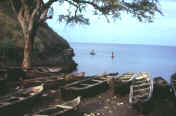|

|
Later on, the plantation cultivation of coffee and cocoa was developed, and the islands and their impressive large-scale plantations (Rocas) became the largest cocoa producers in the world by the start of the 20th century. This unique position was based on the one hand on the unusual organisational talent of the Portuguese colonialists and traders, but also on the slave-owning economy, which had been standard across the world for centuries, and which was not superseded until the 19th century by the introduction of the contractual worker system, which was, however, considered to be just as oppressive by the workers.
In 1975, a national freedom movement within the population, the global influence of communism, and the take-over of Portugal by communist forces led to the collapse of the Portuguese empire and to the independence of São Tomé e Principe in the same year. From that time on, the new state was embedded in a network of communistic African states until 1990.